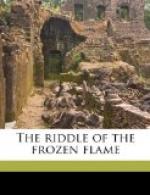Then the judge spoke.
“The court must congratulate you, Mr. Cleek,” he said in his fine, metallic voice, “upon the very excellent and intricate work you have done on this case. Believe me, the Law appreciates it, and I, as one of its humble exponents, must add my admiration to the rest. Permit me, however, to ask one or two questions. In the first place, before we proceed further with the case, I should like you to give me any explanation that you can relative to the matter of what the prisoner here has told us with regard to the story of the Frozen Flame. This gentleman has said that the story goes that whenever a new victim had been claimed by the flames, that he completely vanishes, and that another flame appears in amongst its fellows. The prisoner has declared this to be true; in fact, has actually sworn upon oath, that he has seen this thing with his own eyes the night that Dacre Wynne was killed. I confess that upon hearing this, I had my strong suspicions of his veracity. Can you explain it any clearer?”
Cleek smiled a trifle whimsically, then he nodded.
“I can. Shortly after I made my discovery of the secret passage that led out upon the Fens—the entrance to it, by the way, was marked by a patch of charred grass about the size of a small round table (you remember, Dollops, I asked you if you noticed anything then?), that lifted up, if one had keen enough eyes to discover it, and revealed the trap-door beneath—Dollops and I set out on another tour of investigation. We were determined to take a sporting chance on being winged by the watchful guards and have a look round behind those flames for ourselves. We did this. It happened that we slipped the guard unobserved, having knowledge, you see, of at least part of the whole diabolical scheme, and getting within range of the flames without discovery, or, for that matter, seeing any one about, we got down on our hands and knees and dug into the earth with our penknives.”
“What suggested this plan to you?”
Cleek smiled and shrugged his shoulders.
“Why, I had a theory, you see. And, like you, I wanted to find out if Merriton were telling the truth about that other light he had seen or not. This was the only way. Marsh-gas was there in plenty, though there is no heat from the tiny flames, as you know, from which fact, no doubt, our friend Brellier derived the very theatrical name for them, but the light of which Merriton spoke I took to be something bigger than that. And I had noticed, too, that here and there among the flames danced brilliant patches that seemed, well—more than natural. So our penknives did the trick. Dollops was digging, when something suddenly exploded, and shot up into our faces with a volume of gassy smoke. We sprang back, throwing our arms up to shield our eyes, and after the fumes had subsided returned to our task. The penknife had struck a bladder filled with gas, which, sunk into the ground, produced the larger lights, one of which Sir Nigel had seen upon the night that Wynne disappeared. Even more clever, isn’t it? I wonder whose idea it originally was.”




